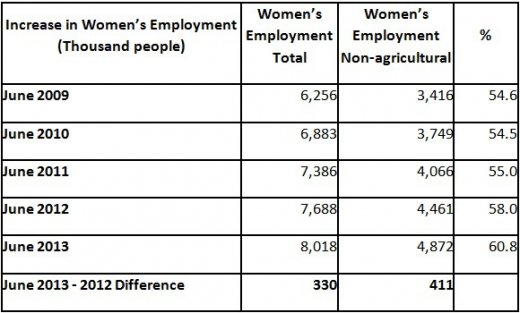TEPAV: "The Number of Women in Urban Employment Increased by 1.5 Million in 4 Years" The rise in women’s employment was driven by the insurance premium incentive for employers who hire women.

ANKARA – TEPAV reports that the exemption of employers from insurance premiums of women workers over a gradual five-year scheme had a partial contribution to the increase in non-agricultural employment amongst women over the last 4 years. This way, urban employment among women increased by 1.5 million people in the mentioned timeframe.
The TEPAV Employment Monitoring Bulletin pointed at the recent upwards trend in women’s employment as observed in employment statistics for June 2013. Non-agricultural employment among women increased by 44 percent from 3.4 million in June 2009 to 4,872,000 in June 2013. This implies that over the last 4 years, non-agricultural employment – urban employment in other words – among women improved by 1.5 million.
The Bulletin assessed that the insurance premium incentive in form of exemption from premium on minimum wage over a gradual five-year scheme that is offered to employers who hire women workers made a significant contribution to the steady increase in women’s employment. The Bulletin said:
“The number of women in the services sector has increased rapidly. The improvement was limited in 2009, when the economy shrunk by around 5 percent. However, women’s employment increased remarkably in 2010 and 2011, when 9 percent growth rate was achieved in each thanks to domestic demand, and in 2012 when GDP growth was a meager 2.2 percent. As of June 2013, non-agricultural employment among women has reached 4.9 million; around 1.5 million being uninsured – in the informal economy. Even so, the share of women in overall non-agricultural employment has picked up from 20 percent to 25 percent.
The share of the manufacturing industry in non-agricultural women’s employment is low at 25 percent. Manufacturing industry jobs for women are predominantly in food, ready-made clothing, and textiles sectors based on cheap labor. Women’s employment in manufacturing is centered in Istanbul and neighboring industrial cities of Tekirdağ, Kocaeli, and Bursa.”
Change in Women’s Employment

- The TEPAV Employment Monitoring Bulletin














